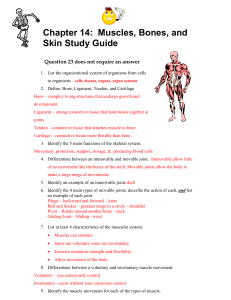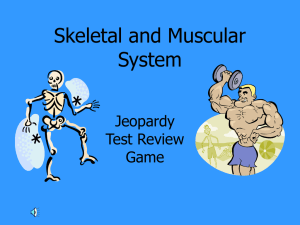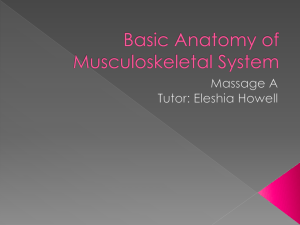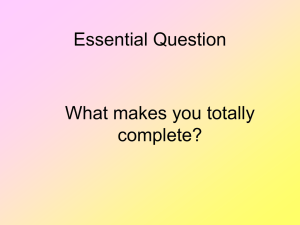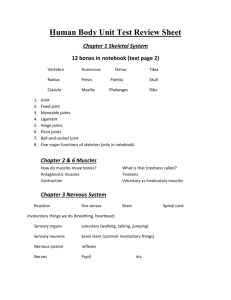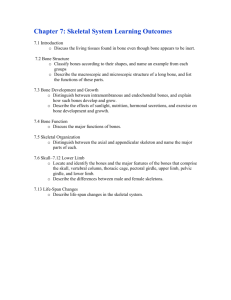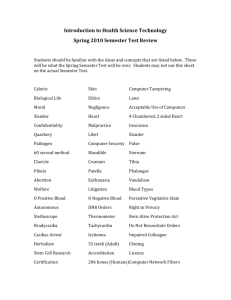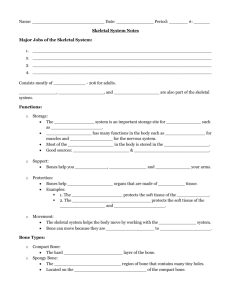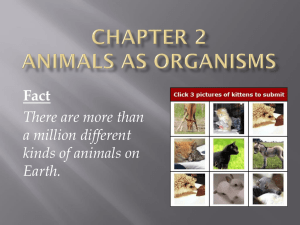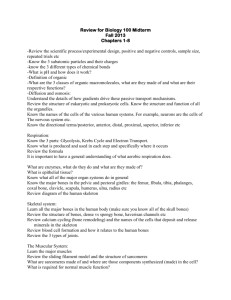Skeletal and Muscular System Open Note Test
advertisement
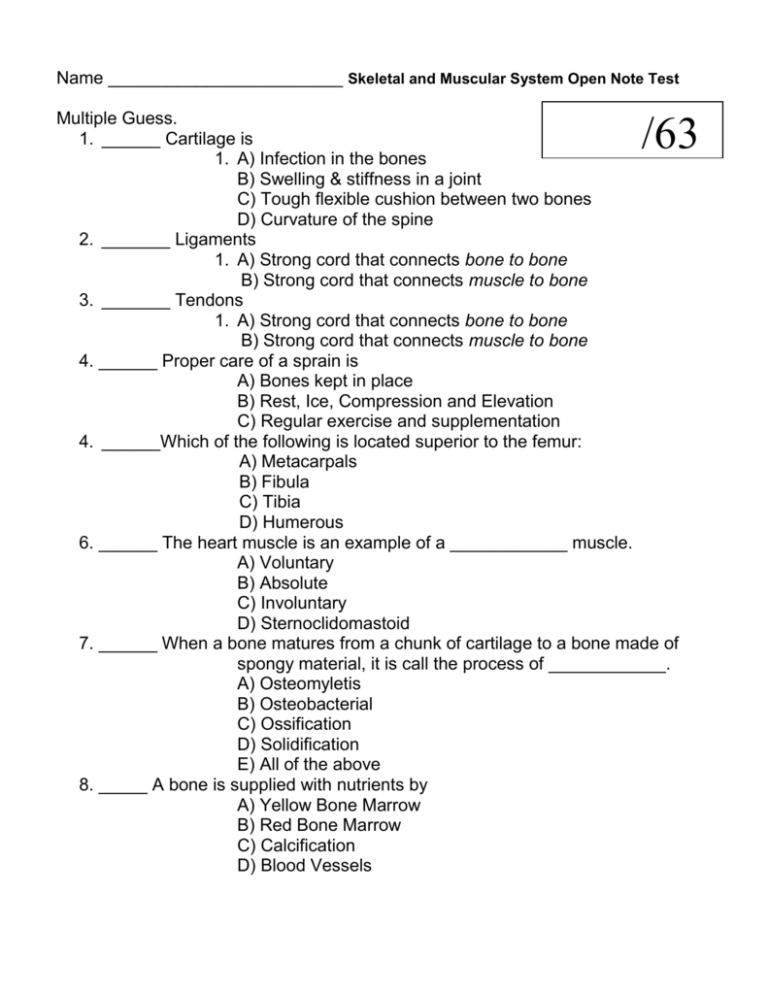
Name ________________________ Skeletal and Muscular System Open Note Test Multiple Guess. 1. ______ Cartilage is 1. A) Infection in the bones B) Swelling & stiffness in a joint C) Tough flexible cushion between two bones D) Curvature of the spine 2. _______ Ligaments 1. A) Strong cord that connects bone to bone B) Strong cord that connects muscle to bone 3. _______ Tendons 1. A) Strong cord that connects bone to bone B) Strong cord that connects muscle to bone 4. ______ Proper care of a sprain is A) Bones kept in place B) Rest, Ice, Compression and Elevation C) Regular exercise and supplementation 4. ______Which of the following is located superior to the femur: A) Metacarpals B) Fibula C) Tibia D) Humerous 6. ______ The heart muscle is an example of a ____________ muscle. A) Voluntary B) Absolute C) Involuntary D) Sternoclidomastoid 7. ______ When a bone matures from a chunk of cartilage to a bone made of spongy material, it is call the process of ____________. A) Osteomyletis B) Osteobacterial C) Ossification D) Solidification E) All of the above 8. _____ A bone is supplied with nutrients by A) Yellow Bone Marrow B) Red Bone Marrow C) Calcification D) Blood Vessels /63 9. _____ What part of the skeletal system consists of the skull, breastbone, ribs and vertebrae? A. Systematic B. Vertebral C. Axial D. Appendicular 10._____What system protects the internal organs from being damaged? A .Muscular B Reproductive C Padded D Skeletal 11._____The appendicular skeleton consist of what parts? A Head, sternum, ribs and vertebrae B Hands, feet, legs, hips and arms C Feet, head, legs, ribs and arms D Hips, head, toes and fingers 12._____ The point at which two bones come together is what? A. Ligaments B. Pivot C. Ossification D. Joint 13._____ The fibrous bands that connects two bones in a joint are A. Cartilage B. Tendons C. Ligaments D. Strings 14. _____ The process in which cartilage is replace by bone is called what? A. Synovial Fluid B. Ossification C. Compact bone D. Fracture 15 _____A break in the bone is called A. Fracture B. Bursitis C. Sprain A. Torn cartilage 16._____The three types of muscle fibers are A. Muscular, heart and rough B. Smooth, cardiac, skeletal C. Heart, quadriceps, sternoclydomastoid D. Smooth, rough, tumor 17. _____ Skeletal muscles are A. Involuntary B. Voluntary 18 ____Your stomach muscle is A. Involuntary B. Voluntary 19____ How do muscles work together? A. Stretch and pull B. Up and down C. Contraction and Extension D. Right and left 20._____The heart is made of what type of muscle fiber? A. Cardiac B. Smooth C. Useful D. Skeletal 21. _____ The esophagus is made of what type of muscle fiber? A. Cardiac B. Smooth C. Useful E. Skeletal Fill Ins – Fill in the missing information about the different type of joints TYPE 22. EXAMPLE Shoulder & Hip Pivot Joint 24. Hinge 25. Moves up & down and side to side. Moves in only one direction 26. 27. Wrists & Ankles Match the term with the correct definition. 28. ________ Flat Bones 29. ________ Short Bones DESCRIPTION 23. A) Bones of the skull. B) Bones of the shoulder and hip 30. ________ Irregular Bones 31. ________ Flat Bones C) Bones such as the humerous, femur, radius, ulna and fibula. D) Bones phalanges and carpals Fill Ins 32. In order to bend your arm at the elbow, you would _________ your bicep. 33. When your arm is bent at the elbow such as in question #32, what are your triceps doing? _____________ 34. Voluntary muscles are muscles that you ___________ control. 35. Involuntary muscles are muscles that you ____________ control. The three types of muscles are 36.___________, 37. ____________ and 30. ____________. R.I.C.E. stands for 38. R________, 39. I___________, 40. C___________ and 41. E________. 42. Osteoporosis is a disease where _____________________________________________. Word Bank for fill in questions Cannot smooth Extend or relax cardiac Can compression rest elevate contract ice bones are brittle and break easily 43. This muscle extends your ulna and radius from the body at the elbow. 44. Starting with your arms above your head, this muscle allows you to pull down on an object. 45. In order to abduct your leg, you must contract which muscle(s)? 49 _______________________ 46_________________ 47 _________________ 50. ______________________ .51.______________________ 48_______________________ 56. 57. 58. 52 59. 60. 53. 61. 62. 54. 55. 63. Bonus: If you were to rotate your leg inward, (rotate toward the midline) what muscle(s) would you contract?
